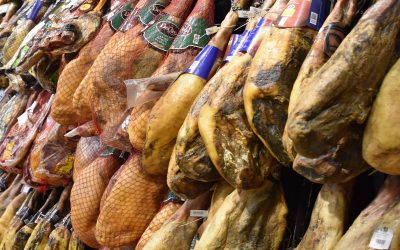CARTIF projects
Agrigenomics and next-generation sequencing technologies
Description
The AGRIGENOMICS AND NEW GENERATION SEQUENCING TECHNOLOGIES research line seeks to implement advanced solutions to solve various problems linked to the agro-forestry and food sectors in Castilla y León, such as soil degradation, low agricultural productivity or the incidence of pests and diseases, considering the entire plant-soil ecosystem as a whole and through a multidisciplinary approach that encompasses agro-biotechnological, chemical-analytical and agronomic methodologies.
Objectives
- Agronomic crop management.
- Monitoring and evaluation of agroforestry systems.
- Research on microbial biodiversity and monitoring of changes in ecosystems through environmental DNA sequencing and DNA metabarcoding.
- Improvement of crop productivity, adaptation to climate change and integrated control.
- Improvement of traditional agro-ecological practices.
Actions
a) Study and monitoring of the biodiversity of agroforestry soils in the region using environmental DNA and metabarcoding DNA analysis methods to determine the distribution, abundance, seasonal change and migration of species present in environmental samples.
b) Study of the microbiome of agricultural soils by profiling complete microbial communities in complex environmental samples, in such a way that the understanding of the different microbial populations present allows to determine the most suitable or adequate practices for the different agricultural soil profiles studied and to generate guidelines for the application of solutions or implementation of efficient agricultural practices that benefit both the performance of the agricultural activity and the regeneration and resilience of the soil agroecosystem.
c) Study and development of bioproducts with agronomic potential, which will make it possible to achieve a substantial improvement in crop productivity and their adaptation to different adverse conditions. Work will also be done on improving more traditional agro-ecological practices, such as crop rotation, increasing pollinators and natural predators for an integrated fight against pests and diseases, natural control of adventitious plants, etc. In addition, it is planned to investigate the biometric and photosynthetic activity of trees and plants, which will allow an assessment of climate change and improvement of the health of plant masses in both agricultural and forestry crops.
Expected Results
- Develop and maintain sustainable rural and urban environments, linked to efficient and sustainable agricultural and forestry productivity.
- Implement agroforestry solutions as a sound method to address climate change and its challenges.
- Research and understand the effects of climate change on forest stands, urban green spaces and agricultural crops in order to develop mitigation strategies.
- Address the phenomenon of “forest decline” through detailed studies of the causes and effects on forest stands.
- Investigate the fragility of crops to climate change in order to develop more resilient and profitable agricultural practices.
R&D Line
- Research on new systems and crop improvement: biological control, adventitious control, plant rotation and association, pest bio-resistance, yield improvement, RNAi and plant genetics strategies and urban agriculture solutions.
Subvención de Apoyo a la inversión para la mejora de las capacidades científicas y tecnológicas de los Centros Tecnológicos de la Comunidad de Castilla y León (2023)
File: 2023 CCTT 06
![]()
![]()

Total Budget: 124,970€
CARTIF Grant: 62,485€
Duration: 02/10/2023 – 31/05/2024
Co-financed with ERDF funds contributing to the Policy Objective “OP1: A more competitive and smarter Europe, promoting innovative and intelligent economic transformation and regional connectivity to information and communication technologies”.
Responsible
Bárbara Díez Rodríguez
Agrifood and Processes Division
Networking
Other projects:
PAVIREX
The PAVIREX project, “New safer pavements in extreme temperature conditions”, was co-financed by the Ministry of Science and Innovation and FEDER Funds, through the INNPACTO 2011 call. The consortium of the project is formed by CARTIF, Grupo Campezo, Euroestudios , Proas (Cepsa), Eiffage, the University of Oviedo and the University of the Basque Country.
CONREPOL
The CONREPOL project will evaluate both chemical procedures based on the use of compounds that increase the surface polarity (silane coupling agents) of the waste and physical treatments with the same objective.
GEOMAF
The GEOMAF project provides railroad maintenance companies with a system that optimizes the maintenance of the railway superstructure and infrastructure.
RENERPATH
This project, which was developed between 2011 and 2013, established an energy rehabilitation methodology based on novel and non-intrusive techniques for the energy analysis applicable to public and private heritage buildings.
SHERIFF
The SHERIFF Project (Hybrid and Economic System of Flexible Integral Facade Rehabilitation) new tools for the energy rehabilitation of buildings.
INNOLIVO
INNOLIVO uses new technologies and processes for the development of innovative olivar products intended for new international markets of high added value
GREEN-CAR
The GREEN CAR ecodesign Project applies the ecodesign methodology to several components of the “electric vehicle” system: batteries, converter, charging points, conditioning systems and auxiliary systems from renewable sources
CAMPOFRÍO
The CAMPOFRÍO project studies and develops a process for reducing salt content in cured ham. Development of a salt content evaluation system in sliced cured ham with on-line NIR technology.
CIBIC
The CIBIC project arises with the objective of improving the services provided by the companies of conservation of infrastructures, based on the application of new technologies to carry out the concept of intelligent systems that will help to improve the quality and the innovation of these services.
REHABCAR
El proyecto REHABCAR (REHABilitación de CARreteras y autopistas) desarrolló nuevas herramientas para la transformación de las carreteras y autovías existentes en infraestructuras económicamente sostenibles y de alta calidad para prolongar su vida útil y adaptarlas a las nuevas necesidades del tráfico.
LIFE RESCATAME
RESCATAME represents a new system for the sustainable management of traffic through the use of models that predict pollution levels, which are supported by data collected by the network of air quality sensors, and that can help to execute a rapid action.
BIOREFINERÍA FT
The FT BIOREFINERY Project consists in developing a technology that allows obtaining 2nd generation liquid biofuels (synthetic diesel) and electrical energy, through the application of gasification and co-gasification processes, of different types of solid and / or liquid waste ( herbaceous biomass, lignocellulosic, glycerin, etc.)
BIALEMA
BIALEMA: RED for the production of Biofuels and its impact on food, energy and the environment. Conducted by Dr. Antonio Francisco Valdes Delgado (CUBAENERGIA).
DINAMO
The DINAMO project is responsible for the development and validation of nanocapsule and nanostructure production technologies of active molecules with functional properties for food use.
BIORECOS
The BIORECOS Project aims to design and build a demonstration plant of a modular nature that allows, through pyrolysis, the production of charcoal and / or active coal, as well as the generation of electrical energy.
ENHANCE HEALTH
The ENHANCE HEALTH project focuses on environmental and health concerns related to air pollution produced by industries and waste incinerators in urban areas.















